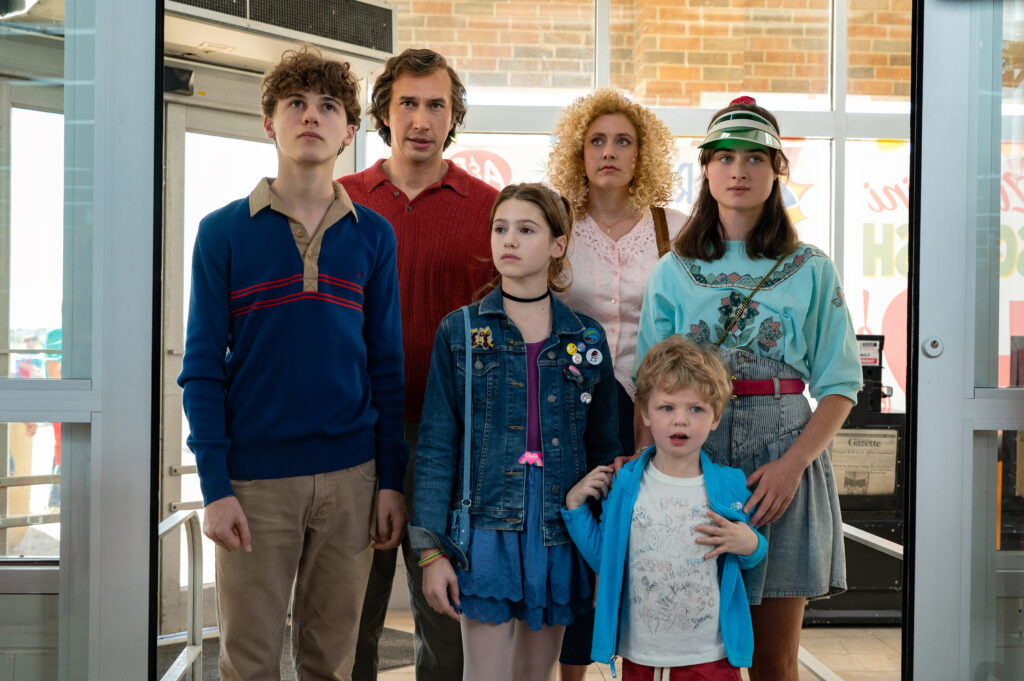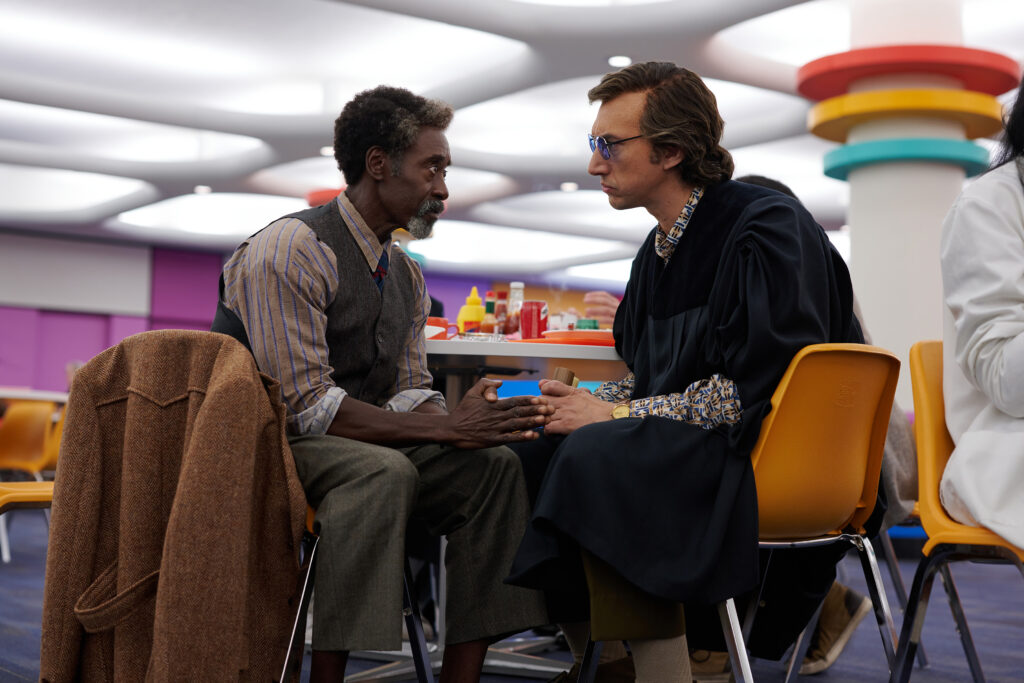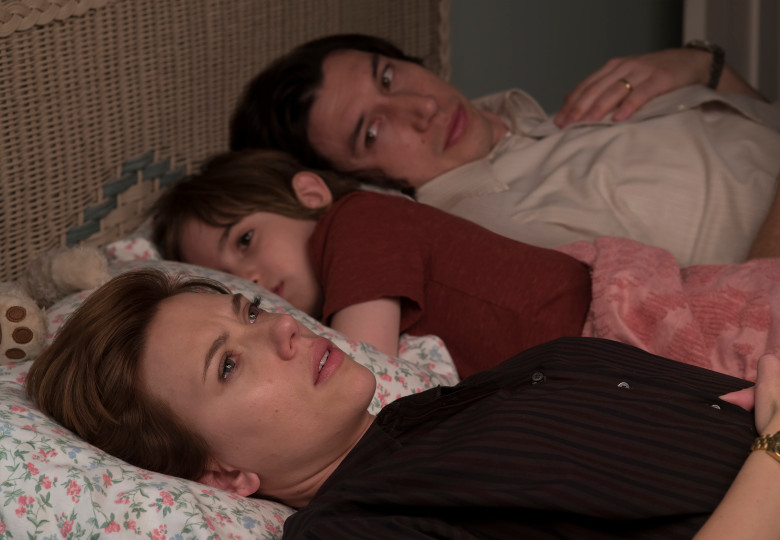September 30, 2022
by Carla Hay

Directed by Noah Baumbach
Culture Representation: Taking place in Ohio, the comedy/drama film “White Noise” features a predominantly white cast of characters (with some African Americans) representing the working-class and middle-class.
Culture Clash: A college professor and his family begin to see life differently after a toxic pollution disaster forces residents in their area to evacuate and take shelter in public places.
Culture Audience: “White Noise” will appeal primarily to people who are fans of filmmaker Noah Baumbach; stars Adam Driver, Greta Gerwig, and Don Cheadle; and comedy/drama films with life-and-death themes.

With acerbic wit about life and death, “White Noise” memorably shows how a college professor and his family cope with an unexpected evacuation from a pollution disaster. In this well-acted but uneven comedy/drama, the real disaster is dishonesty in relationships. The movie covers both familiar and unfamiliar territory for writer/director/producer Noah Baumbach, whose speciality is making movies about neurotic, middle-class people who deal with problems that they usually bring on themselves.
“White Noise,” which is based on Don DeLillo’s 1985 novel of the same name, had its world premiere at the Venice International Film Festival in Italy and its North American premiere at the 2022 New York Film Festival in New York City. The “White Noise” movie is also set in the early-to-mid-1980s. Baumbach’s “White Noise” cinematic adaptation is quintessential Baumbach, with a talented cast who adeptly handle the verbose dialogue. In Baumbach’s movies, the characters tend to do an over-analysis of people and life, to great comedic effect.
What isn’t typical of Baumbach is for him direct a movie from an adapted screenplay. The previous movies that Baumbach has directed were from his own original screenplays. Baumbach also never done a disaster movie that will get some comparisons to the way that Steven Spielberg does disaster movies.
“White Noise” isn’t a big-budget blockbuster. However, “White Noise” does have some tense action sequences of people trying to find shelter in a disaster, in scenes that are very reminiscent of Spielberg’s 2005 version of “War of the Worlds.” There’s no outer-space alien invasion in “White Noise. The real disruption comes to members of a family who are forced to confront uncomfortable truths about themselves after they evacuate from their home during the disaster.
In “White Noise,” which takes place in an unnamed cities in Ohio, a college professor named Jack Gladney (played by Adam Driver) thinks he’s living a very safe and comfortable life where he has a lot of patriarchal control. Jack teaches the unusual subject of “advanced Nazism” at a learning institution that is never named in the movie, but is referred to as the College on the Hill. Jack usually thinks he’s the smartest person in the room at any given time (a personality trait of least one main character in a typical Baumbach film), so Jack tends to be overbearing and arrogant, but not to the point of being completely obnoxious.
Jack lives with his wife Babette (played by Greta Gerwig), who works as an activities director at a senior living center. Babette and Jack have a blended family that includes four children. Eldest child Heinrich (played by Sam Nivola), a son from Jack’s previous marriage, is about 16 years old and has a keen interest in science. The middle children are Babette’s two daughters from her previous marriage: Denise (played by Raffey Cassidy), who’s about 15 years old, and Steffie (played by May Nivola), who’s about 12 years old. Jack and Babette have a biological child together named Wilder (played by identical twins Henry Moore and Dean Moore), who’s about 4 years old.
The first third of the movie mostly shows how Jack interacts with people in his home and at work. At home, Jack and his very opinionated family frequently talk over each other and have simultaneous conversations with each other. Babette tends to be cheerful and optimistic. Jack tends to be stern and cynical. Mornings in the kitchen and dining room can be described as ordered chaos, as Heinrich, Denise and Steffie sometimes bicker, while their parents try to get everyone out of the house in time to go where they need to be.
At work, Jack takes pleasure in commanding the room with his in-depth lectures about Nazis. The movie never explains why Jack is so fascinated with Nazis (he does not endorse this hate group), but in his lectures, Jack drops hints that people need to study what the Nazis did so that atrocities like the Holocaust won’t happen again. As a history expert, Jack is profoundly awestuck by how quickly Adolf Hitler’s Nazi regime took over Europe and had far-reaching effects across the world.
Jack has a friendly rapport with his Murray Suskind (played by Don Cheadle), an entertainment industry professor at the same college. In the opening scene of “White Noise,” Murray is seen giving an enthusiastic lecture about the art of car crashes in American movies. He even goes as far to say that car crashes in American movies are superior than car crashes in European movies.
Murray tells his students that these cinematic car crashes are “a long tradition of American optimism” and “self-celebration.” Murray adds, “Look past the violence, I say, and there is a wonderful, brimming spirit of innocence and fun.” Murray’s lecture is the movie’s first indication that several of the movie’s characters are living in a safe bubble that’s about to be popped.
Murray greatly admires Jack’s lecture styling, so later in the movie, there’s an amusing scene where Jack (at Murray’s invitation) is a guest speaker in Murray’s classroom. The topic is about Elvis Presley, but Jack has been asked to give information showing how Presley and Hitler had many things in common. For example, Presley and Hitler both had fanatical followings and both were “mama’s boys” with domineering mothers.
This “Presley/Hitler” lecture starts off as a dual presentation, with Murray and Jack taking turns giving factoids about Presley and Hitler. But then, Jack shows his tendency of taking control of everything he does, and Jack ends up taking over the lecture and doing all the talking. Jack gets so worked-up and passionate in his speaking that he almost acts like a pastor preaching to a congregation.
Jack’s speech culminates with Jack getting a standing ovation from everyone else in the room, including a few other faculty members who stopped by to hear Jack speak in this class. One of these co-workers is a professor named Elliot Lasher (played by André Benjamin. also known as André 3000), who’s a mild-mannered eccentric who doesn’t do much in his scenes except smile and give words of encouragement to the people around him.
Jack’s ego certainly gets a boost from this standing ovation. But within the 24 hours, his world will come crashing down with an avalanche of insecurity, deceit and mistrust. It starts off when Denise tells Jack that, in the kitchen garbage can, she found an empty prescription pill bottle owned by Babette. The prescription label on the bottle says that it contained a drug called Dylar.
Denise is worried because she can’t find Dylar in any medical book. (Remember, this story takes place in the 1980s, before the Internet existed.) Jack acts like he isn’t too worried, but deep down, he’s concerned too because he didn’t know anything about this prescription. Jack doesn’t confront or ask Babette about this secret prescription right away.
But something about this deception must have triggered something in Jack, because he starts to have harrowing nightmares that seem real. For example, he has a vision of a Jack clone or alter ego climbing into bed with him and sleeping in the place on the bed where Denise usually sleeps. In one of these nightmares, this Jack “clone” almost get suffocated by a blanket by an unseen force.
Meanwhile, a truck carrying toxic chemicals crashes into a moving train when the truck driver is distracted by grabbing a bottle of liquor from a passenger seat. It results in a massive train wreck and an explosion that destroys the truck and sends toxic chemicals in the air. The smoke can be seen for miles away.
One of the people who sees this smoke is Heinrich, who looks at it from afar with his binoculars. Heinrich heard about the train wreck on the local TV news. And he’s afraid that the toxic chemicals could pollute the air and be disaster for the area residents. Henrich tells his parents that maybe they should temporarily evacuate if the smoke comes any closer.
At first, Jack and Babette (especially Jack) are dismissive of Heinrich’s concerns. Jack says that it’s unlikely that the family will be affected by the smoke, since it’s not windy outside at the moment. And when it does get windy, Jack says that wind tends to blow in the direction that’s the opposite of their house.
It turns out that Jack is very wrong about his assumptions. The TV news descriptions of this pollution goes from being described as “a black billowing cloud” to “the airborne toxic event.” Emergency officials are ordering local residents to evacuate. Still in denial, Jack and Babette don’t think it’s that big of a deal.
But their attitude quickly changes when they see their neighborhood become deserted, with fire trucks and other emergency vehicles racing everywhere. By the time the Gladney family members evacuate their home, they’re in a sheer panic. While driving in the family car to go to the nearest designated shelter, they encounter many obstacles, including a traffic jam.
The rest of “White Noise” shows how the family members bond together and fall apart in certain ways during this disaster. While in the car, Jack notices Babette put something in her mouth and quickly swallow it, so he asks her what she just swallowed. Babette says it was a piece of Life Savers candy, but Jack is doubtful. He begins to wonder if it was a pill of the mysterious drug Dylar.
“White Noise” shows in clever and sometimes oddly amusing ways how the problems that are exposed in the Gladney family are a microcosm of a larger society problem of people being lulled and sometimes programmed into a false sense of security. It comes out in subtle and not-so-subtle symbolism and conversations in the movie. The character of Jack embodies this dichtomy of someone who thinks he’s in total control of his life but finds out that his life can quickly get out of his control, thereby making him question how much control he really has.
For example, when Henrick warns his family that the mysterious smoke could be dangerous pollution, Jack’s condescending comments is that if it turns into a disaster, the “poor and uneducated” will be the ones who will be hurt the most. Jack’s attitude is a satire of a very real mentality that middle-class and upper-class intellectuals have that they are somehow “immune” from catastrophes because they think they’re too smart and will somehow know how to avoid them.
Jack’s ego gets a little confused and flustered when he finds out that Heinrich knows a lot more about this type of science than Jack does. Jack seems proud of Heinrich for this knowledge, but it still makes Jack a little uneasy that Heinrich correctly predicted this disaster when Jack had been so dismissive and wrong about it. And with Heinrich outsmarting Jack when it comes to the science of this disaster, Jack turns toward his marriage to assert some of the dominance that he expects.
All of the cast members are well-suited to their roles, but the movie is really about what happens between Jack and Babette. They don’t have the type of marriage that is headed for divorce, unlike the couple in Baumbach’s 2019 drama “Marriage Story,” for which Driver earned an Oscar nomination for Best Actor. Instead, Jack and Babette go through experiences that will make them reconsider how they are going to handle their marriage after the evacuation is over.
The fear of death and how to prepare for death are overarching themes in “White Noise,” as the pollution disaster makes several people confront their mortality. Early on in the movie, before even knowing that this disaster would happen, Jack tells Babette that he wants to die before her and that her death will be more spectacular than his. Jack says that Babette would be able to cope with being a widowed spouse better than he would be able to cope with being a widowed spouse. It might sound like a backwards compliment to Babette, but it’s really Jack’s way of saying that he doesn’t want to be a lonely widower who dies alone.
“White Noise” is hit or miss when it comes to character development. Cassidy (as Denise), Sam Nivola (as Heinrich), May Nivola (as Steffie) have believable chemistry together as stepsiblings trying to adjust to their blended family situation. (Sam and May Nivola are siblings in real life. Their parents are actors Alessandro Nivola and Emily Mortimer.) By the last third of the movie, the kids are essentially sidelined for some soap opera-ish drama between Jack and Babette.
Jack’s college professor colleagues are undeveloped supporting characters. Viewers won’t find out much about Murray, Elliot and the other co-workers who frequently have lunch with Jack: neurochemist Winnie Richards (played by Jodie-Turner Smith), Alfonse (played by Sam Gold) and Cotsakis (played by George Drakoulias). Barbara Sukowa makes the most out of her cameo as an atheist nun called Sister Hermann Marie. Other characters appear in and out of the story like comedic plot devices, rather than people with fully developed personalities.
The conversations in “White Noise” have a cadence that might remind viewers of a stage play. Baumbach and the cast members have given interviews, including a press conference held after the movie’s New York Film Festival’s “White Noise” press screening, where it’s mentioned that the cast members had one month of rehearsals before filming the movie. Most movie productions do not have that rare rehearsal privilege for cast members.
The ending of “White Noise” might seem a little too conveniently contrived for some people’s tastes. However, the end-credits sequence is a must-see for viewers, because this sequence artfully ties in together many of the movie’s themes, (The end-credits sequence involves dance choreography at an A&P grocery store while the LCD Soundsystem song “New Body Rhumba” plays on the movie soundtrack.) The “white noise” of life can either pacify, agitate or do both, depending on the people and the circumstances. The movie “White Noise” asks people and wants to know: “Are you paying attention to the white noise in the first place?”
Netflix will release “White Noise” in select U.S. cinemas on November 25, 2022. The movie will premiere on Netflix on December 30, 2022.

